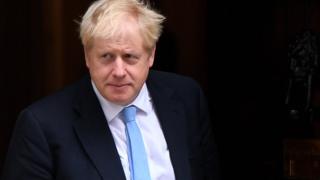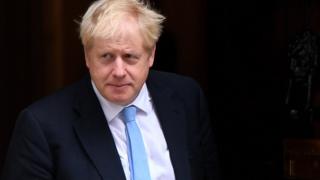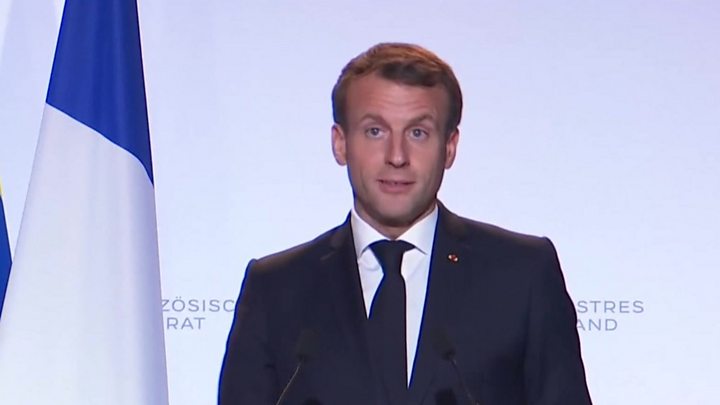Brexit: PM heads to EU summit as deal talks continue
Boris Johnson travels to Brussels as efforts continue back home to win support for his Brexit deal. …

 Image copyright PA Media
Image copyright PA Media Boris Johnson will travel to Brussels later for a crunch EU summit, as efforts continue to win support for his Brexit deal from MPs at home.
The prime minister needs the EU to approve his deal at the gathering in order to avoid delaying Brexit beyond the scheduled 31 October deadline.
But in Westminster, the Democratic Unionist Party has so far refused to sign off on the PM’s draft agreement.
The party’s support is seen as crucial if Parliament is to approve his plans.
On the EU’s side, the legal text of a draft Brexit deal is seen as being “pretty much ready”, the BBC’s Europe editor Katya Adler said.
But the UK government has yet to approve the documents amid reports the DUP remains unhappy about elements of the prime minister’s revised plan for Northern Ireland.
The party has helped prop up the Conservative government since the 2017 general election.
In the past, a number of Tory Brexiteers have said their own support for a Brexit deal was contingent on the DUP’s backing of any agreement.
Mr Johnson’s proposals for a new Brexit deal hinge on getting rid of the controversial backstop – the solution to border issues agreed by former PM Theresa May which proved unpalatable to many MPs.
However, his plans would see Northern Ireland treated differently from the rest of the UK – something the DUP, among others, has great concerns about.

Media playback is unsupported on your device
The DUP has demanded assurances around the so-called consent mechanism – the idea the prime minister came up with to give communities in Northern Ireland a regular say over whatever comes into effect.
The BBC has learned that the draft Brexit deal has a mechanism enabling Northern Ireland to approve or reject the border plans.
This would give the Stormont Assembly the chance to vote on Brexit arrangements four years after the Brexit transition period ends in 2020.
The DUP’s leader, Arlene Foster, held talks in Downing Street on Tuesday night and Wednesday morning.
A source told Newsnight’s political editor Nick Watt the thinking in Number 10 was that “the DUP never want to own a solution – at some point you have to call their bluff. You just have to hope they will sulkily acquiesce”.
As well as the DUP, Mr Johnson is also trying to secure support from Tory Brexiteers, most of whom are part of the European Research Group.
ERG chairman Steve Baker told reporters after a meeting in Downing Street on Wednesday evening his group “hope [to] be with the prime minister, but there are thousands of people out there who are counting on us not to let them down and we are not going to”.
“We are just really wishing the prime minister well and hoping he has total success. We know there will be compromises, but we will be looking at this deal in minute detail with a view to supporting it, but until we see that text, we can’t say.”
The Irish Prime Minister Leo Varadkar has said that if a deal cannot be completed at the two-day summit, European leaders could gather again before the end of the month to continue Brexit talks.
On Wednesday, Mr Johnson likened the Brexit talks to climbing Everest, saying the summit was “not far” but still surrounded by “cloud”, according to MPs he addressed at the 1922 committee of backbenchers.
As Wednesday draws to a close, a deal is still DBP – difficult but possible, in case you haven’t caught the lingo by now.
I hear from both sides of the Channel that the issues between the UK, Ireland and the EU are pretty much ironed out.
A schedule is in place for EU leaders to be able to sign off a deal tomorrow, discussing it as the first item on the agenda at the summit if the ink is dry.
The government has in place its plan to ask MPs to approve the hypothetical deal in Parliament on Saturday.
Despite all the obstacles, all the warnings about the tightness of the timetable, it is not yet too late.
Mr Johnson faces another deadline on Saturday – the date set out in the so-called Benn Act, which was passed last month by MPs seeking to avoid a no-deal Brexit.
If MPs have not approved a deal – or voted for leaving the EU without one – by Saturday, then Mr Johnson must send a letter to the EU requesting an extension to 31 January 2020 – something he has repeatedly refused to do.
On Wednesday, Brexit Secretary Stephen Barclay confirmed Mr Johnson would write such a letter if no deal was in place by Saturday.
The prime minister’s official spokesman confirmed the government will table a motion for Parliament to sit this Saturday from 09:00 to 14:00 BST.
However, this does not mean the House of Commons will definitely sit on Saturday – the government could table the motion but not push it to a vote.




